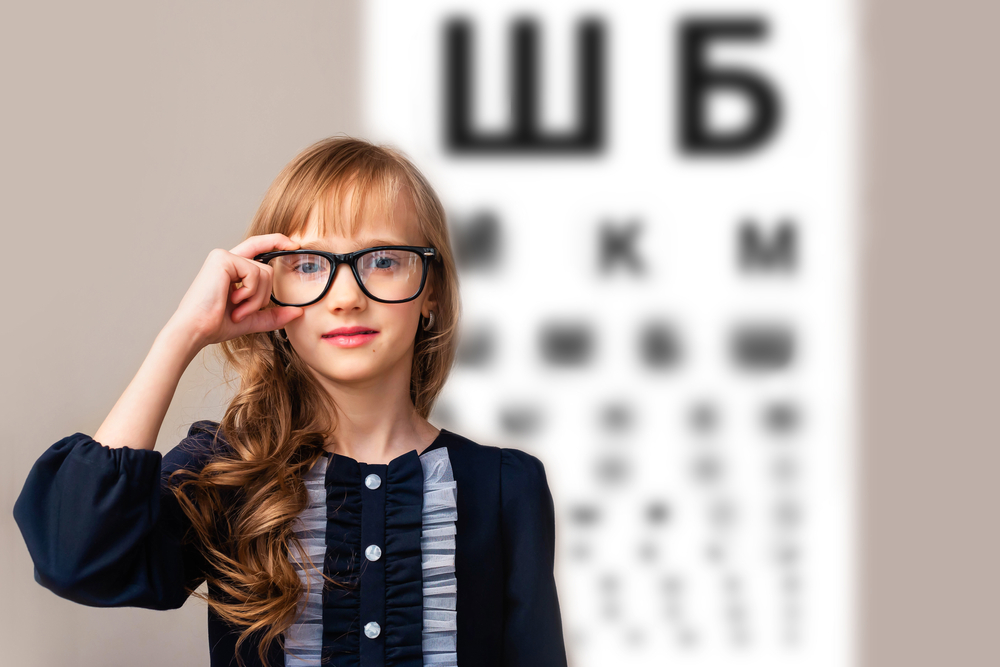
Myopia is a refractive error in which the eye focuses light in front of the retina, resulting in blurred distant vision. This condition typically develops during childhood and can progress over time, leading to higher levels of nearsightedness. While the exact causes of myopia are not fully understood, a combination of genetic and environmental factors, such as excessive near-work activities and lack of outdoor time, are believed to contribute to its development.
Recognizing Symptoms of Myopia in Children
Recognizing the signs of myopia in your child is the first step towards early detection and management. Some common symptoms of myopia in children include:
Squinting or Struggling to See Distant Objects: Your child may have difficulty seeing the blackboard, TV, or other distant objects clearly.
Frequent Headaches or Eye Strain: Prolonged near-work activities, such as reading or using digital devices, can cause headaches or eye fatigue.
Sitting Close to the TV or Computer Screen: Your child may unconsciously move closer to the screen to see it better.
Avoiding Outdoor Activities: Your child may show a preference for indoor activities that involve close-up tasks, such as reading or playing video games.
The Importance of Regular Pediatric Eye Exams for Early Detection
Regular pediatric eye exams are crucial for the early detection and management of myopia in children. The American Optometric Association recommends that children have their first comprehensive eye exam at 6 months of age, followed by exams at 3 years old and 5-6 years old. These exams can help identify any vision problems, including myopia, and allow for timely intervention.
During the exam, the optometrist will assess your child's visual acuity, refractive error, and overall eye health. Early detection of myopia is essential, as it allows for the implementation of effective myopia management strategies to slow the progression of the condition and prevent it from worsening.
The Role of Myopia Management in Children
Myopia management is a proactive approach to addressing the progression of nearsightedness in children. By implementing various strategies, optometrists can help slow down or even halt the advancement of myopia, reducing the risk of associated vision problems later in life. Some of the key benefits of effective myopia management include:
Preventing or delaying the onset of higher levels of myopia
Reducing the risk of vision-threatening eye conditions, such as retinal detachment, glaucoma, and macular degeneration
Improving overall visual function and quality of life for the child
Orthokeratology as a Myopia Management Option
Orthokeratology, also known as Ortho-K, is a non-surgical, reversible method of temporarily reshaping the cornea to improve vision. During this process, your child wears specially designed rigid gas-permeable contact lenses overnight, which gently flatten the cornea. This temporary reshaping allows your child to see clearly during the day without the need for glasses or daytime contact lenses.
Ortho-K has been shown to be an effective myopia management strategy, as it can slow the progression of nearsightedness in children. The benefits of Ortho-K include:
Improved daytime visual acuity without the need for glasses or contacts
Potential to slow the progression of myopia, reducing the risk of associated vision problems
Reversible and non-surgical approach
Atropine Drops for Myopia Control in Children
Atropine eye drops are another myopia management option that has been extensively studied. Atropine works by temporarily relaxing the focusing mechanism of the eye, which can help slow the progression of myopia in children.
The use of low-dose atropine (0.01%) has been found to be effective in slowing myopia progression with minimal side effects. The benefits of atropine for myopia control include:
Potential to slow the rate of myopia progression by up to 60%
Reversible effects, allowing for normal eye function when the treatment is discontinued
Dual-Focus Soft Contact Lenses for Managing Myopia
Dual-focus soft contact lenses are a newer myopia management option that has shown promising results. These specialized lenses have a central optical zone for clear distance vision, surrounded by a peripheral zone that provides a slight myopic defocus. This design helps to slow the elongation of the eye, which is a key factor in the progression of myopia. The benefits of dual-focus soft contact lenses for myopia management include:
Effective in slowing the progression of myopia in children
Comfortable and convenient for daily wear
Schedule Your Child’s Eye Exam with My Vision Today
Myopia in children is a prevalent and often progressive condition that requires proactive management. By understanding the symptoms, recognizing the importance of regular pediatric eye exams, and exploring effective myopia management strategies, you can help ensure your child's visual development and overall eye health.
Take the first step in protecting your child's vision by scheduling a comprehensive eye exam with Dr. Rammohan at My Vision. Early detection and proactive management of myopia can make a significant difference in your child's visual development and long-term eye health. Visit our office in Bethlehem, Pennsylvania, or call (610) 424-2020 to learn more about our myopia management services and how we can help your child see their best.








